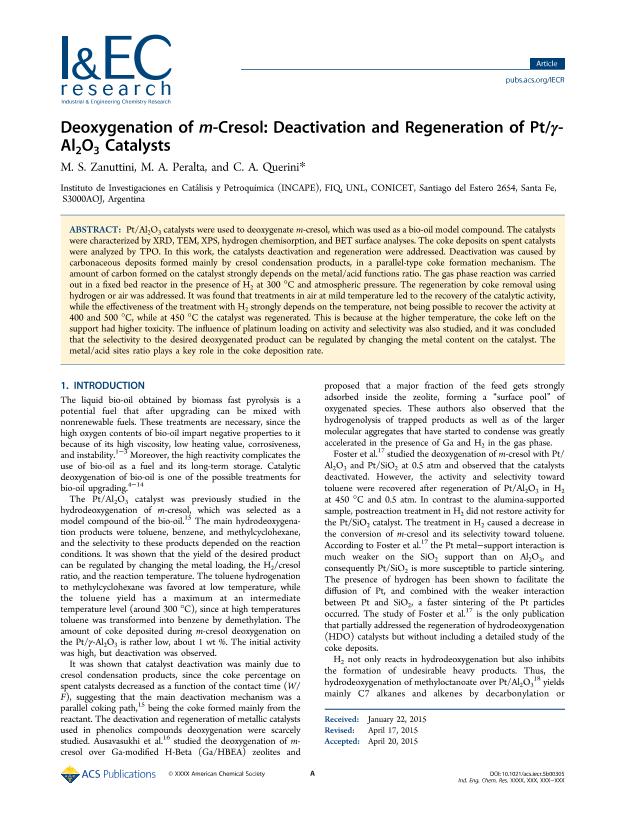Artículo
Deoxygenation of m-cresol: deactivation and regeneration of Pt/γ-Al2O3 Catalysts
Fecha de publicación:
04/2015
Editorial:
American Chemical Society
Revista:
Industrial & Engineering Chemical Research
ISSN:
0888-5885
Idioma:
Inglés
Tipo de recurso:
Artículo publicado
Clasificación temática:
Resumen
Pt/Al2O3 catalysts were used to deoxygenate m-cresol, which was used as a bio-oil model compound. The catalystswere characterized by XRD, TEM, XPS, hydrogen chemisorption, and BET surface analyses. The coke deposits on spent catalystswere analyzed by TPO. In this work, the catalysts deactivation and regeneration were addressed. Deactivation was caused bycarbonaceous deposits formed mainly by cresol condensation products, in a parallel-type coke formation mechanism. Theamount of carbon formed on the catalyst strongly depends on the metal/acid functions ratio. The gas phase reaction was carriedout in a fixed bed reactor in the presence of H2 at 300 °C and atmospheric pressure. The regeneration by coke removal usinghydrogen or air was addressed. It was found that treatments in air at mild temperature led to the recovery of the catalytic activity,while the effectiveness of the treatment with H2 strongly depends on the temperature, not being possible to recover the activity at400 and 500 °C, while at 450 °C the catalyst was regenerated. This is because at the higher temperature, the coke left on thesupport had higher toxicity. The influence of platinum loading on activity and selectivity was also studied, and it was concludedthat the selectivity to the desired deoxygenated product can be regulated by changing the metal content on the catalyst. Themetal/acid sites ratio plays a key role in the coke deposition rate.
Palabras clave:
M-Cresol
,
Deoxygenation
,
Platinum
,
Deactivation
Archivos asociados
Licencia
Identificadores
Colecciones
Articulos(INCAPE)
Articulos de INST.DE INVEST.EN CATALISIS Y PETROQUIMICA "ING. JOSE MIGUEL PARERA"
Articulos de INST.DE INVEST.EN CATALISIS Y PETROQUIMICA "ING. JOSE MIGUEL PARERA"
Citación
Zanuttini, María Soledad; Peralta, María Ariela; Querini, Carlos Alberto; Deoxygenation of m-cresol: deactivation and regeneration of Pt/γ-Al2O3 Catalysts; American Chemical Society; Industrial & Engineering Chemical Research; 54; 18; 4-2015; 4929-4939
Compartir
Altmétricas




